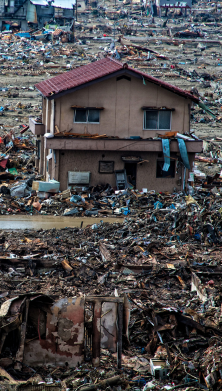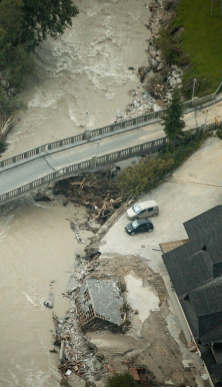This article is part of the Allianz Risk Barometer 2022
Heavy rain in Western Europe, storms and tornadoes in the US, flooding in Asia – climate-related weather events affected numerous companies around the world in 2021, causing massive property damage and business interruptions and insured losses in excess of $100bn – the fourth highest annual total on record.
It’s unsurprising then that climate change records its highest-ever position of sixth in the Allianz Risk Barometer, whilenatural catastrophes ranks in the top three risks .
“The risks to businesses from global warming are being experienced with increasing force and immediacy – as direct damage after extreme weather events, but also leading to tightening regulation, and as threats to brand and reputation,” says Line Hestvik, Chief Sustainability Officer at Allianz.
“In addition to acute issues such as pandemic management and the volatile economic environment dominating the day-to-day business of risk management, the pressure on businesses to act on climate change has increased noticeably over the past year, with a growing focus on the net-zero contribution.”
Allianz Risk Barometer 2022
Climate change: ↑ Rank 6 (17%)
Ranking history:
2021: 9 (13%)
2020: 7 (17%)
2019: 8 (13%)
2018: 10 (10%)
2017: 14 (6%)
More and more companies are therefore presenting strategies for reducing greenhouse gas emissions in their operations and also analyzing business opportunities for climate-friendly technologies and sustainable products.
They are rethinking protection measures for sites and production plants to make them more robust against increasing extreme weather events, implementing climate and energy regulations and, increasingly, preparing to meet comprehensive reporting requirements.
“Protection and adaptation to climate-related changes are also increasingly being discussed at management level,” says Hestvik.
“In the coming years, many corporate decision-makers will be looking even more closely at the impact of climate risks in their value chain and taking appropriate precautions. There is also a clear trend toward building up dedicated competencies within companies around climate risk mitigation. Together with sustainability experts, risk managers will play an increasingly important role in the future in preparing companies for the risks of climate change and combatting global warming.”
Climate change – What are the most significant exposures this creates for your company?
Source: Allianz Risk Barometer 2022
Figures represent the percentage of answers of all participants who responded (454). Figures do not add up to 100% as up to three risks could be selected.
Climate change litigation hotting up
Recent years have seen a surge in climate change-related cases. The cumulative number has more than doubled since 2015 [1], according to a recent Oxford University/ Climate Neutrality Forum report presented at the COP26 summit. Just over 800 cases were filed between 1986 and 2014, while over 1,000 cases have been brought in the last six years.
Cases have tended to focus on the nature of investments, although there is a growing use of litigation seeking to drive behavioral shifts and force disclosure debate. In November 2020, a case was settled involving a $57bn superannuation fund in Australia, Rest [2]. The claimant alleged Rest’s failure to disclose and address climate risk breached legislation. The fund committed to a raft of new disclosure and climate change-related initiatives in response.















